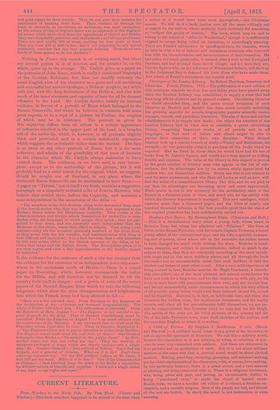A Child of Fortune. By Stephen J. MacKenna. 3 vols.
(Hurst and Blackett)—A. military novel, when it is a novel of the barracks, is not an agreeable specimen of literature. We call this a military novel, because the characters in it are soldiers, or wives, or relations, or per- sons in some way connected with soldiers. And there are references in it to parades and to gradations of rank. But it is not about military matters in the same way that a clerical novel would be about clerical matters. Betting, gambling, swearing, gossiping, and mischief-making are the chief employments of the characters, with, of course, love-making. In this particular instance, there is a great secret, and a vast amount of plotting and lying connected with it. There is a religious lieutenant, who, being pious and poor, and having an unreasonable dislike to being "purchased over," is made the object of special scorn._ Beside these, we have a terrible old villain of a colonel, a drunken ex- chaplain, and a rascally surgeon. Most of the people are bad, and almost all the rest are foolish. In short, the novel is not instructive, or even amusing.


































 Previous page
Previous page